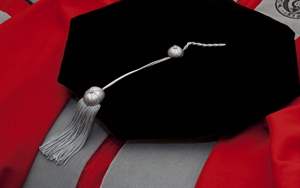Headlines
 Offline
OfflineCommunity engagement involves higher education faculty, staff, or students applying

For the purposes of this journal, community engagement involves higher education faculty, staff, or students applying their disciplinary knowledge to foster community projects that result in solutions to problems of practice. There are a wide range of projects that could be included to document the engagement. Among other possibilities, portfolios of such engagement could include applying knowledge about student learning to develop programming for a local youth organization, documenting mission…
 Offline
OfflineConley (2012) claims that the purpose of academic journals is to foster

What is the purpose of academic journals? Conley (2012) claims that the purpose of academic journals is to foster communication amongst scholars, to provide a proving ground for practical and theoretical ideas, and to document emerging scientific knowledge. This list begs the question. Is there a hierarchy of purposes, or do they each have relatively equal merit? Reviewing rating schema such as "impact" factors would seem to indicate that there is a hierarchy, and that documenting scientific…
 Offline
OfflineFostering certain attitudes of reflection increases the likelihood of being effective in reflective thinking.

Fostering certain attitudes of reflection increases the likelihood of being effective in reflective thinking. Dewey (1933/1989) stated there are three important attitudes to cultivate, which include open-mindedness, whole-heartedness, and responsbility. Open-mindedness refers to freedom from embracing preconceived notions in light of new ideas or evidence. It can also mean a receptivity to new ideas. Whole-heartedness refers to focusing attention on the topic of interest, not dividing attention…
 Offline
OfflineSuch a profile might have three principal parts.

"Such a profile might have three principal parts. First, to be fair, it would begin with a statement of responsibilities for the period under review, expectations set personally by the scholar or incorporated into a contract negotiated with the institution. Second, for breadth, a biographical sketch would list the scholar's achievements in the relevant areas of scholarly work. Third, for depth, selected samples of the scholar's best work would be documented to the standards by a reflective…
 Offline
OfflineIt is important to recognize that appropriate and credible reviewers may be found not only among

To understand the possible scope of peer reviewing, one must first define "peer." The Boyer model offers a broad definition. "It is important to recognize that appropriate and credible reviewers may be found not only among fellow specialists and current students but also among former students, clients, nonacademic authorities, and practitioners in the field." (Glassick, Huber, & Maeroff, 1997, p. 38).
Glassick, C. E., Huber, M. T., & Maeroff, G. I. (1997). Scholarship assessed:…
 Offline
OfflineSuch practices [of avoiding subjective or qualitative evaluations of quality in scholarship] have invited abuse.

"Such practices [of avoiding subjective or qualitative evaluations of quality in scholarship] have invited abuse. Attempts at objectivity led to a system in which activities that were not so easily quantified--teaching, integrative work, and applied work--were avoided as a waste of valuable time" (Glassick, Huber, & Maeroff, 1997, p. 20).
Glassick, C. E., Huber, M. T., & Maeroff, G. I. (1997). Scholarship assessed: Evaluation of the professoriate. San Francisco, CA: Jossey-Bass.
 Offline
Offline...reflection is not an end in itself but a tool or vehicle used in the transformation of raw experience into meaning-filled theory...
 "...reflection is not an end in itself but a tool or vehicle used in the transformation of raw experience into meaning-filled theory that is grounded in experience, informed by existing theory, and serves the larger purpose of the moral growth of the individual and society" (Rodgers, 2002, p. 863).
"...reflection is not an end in itself but a tool or vehicle used in the transformation of raw experience into meaning-filled theory that is grounded in experience, informed by existing theory, and serves the larger purpose of the moral growth of the individual and society" (Rodgers, 2002, p. 863).
Rodgers, C. (2002). Defining reflection: Another look at John Dewey and reflective thinking. Teachers College Record, 104(4), 842-866.
 Offline
OfflineBy scholarship of application we mean having professors become what Donald Schön of MIT has called ‘reflective practitioners,’

Scholarship of Application
"By scholarship of application we mean having professors become what Donald Schön of MIT has called ‘reflective practitioners,’ moving from theory to practice, and from practice back to theory, which in fact makes theory, then, more authentic . . . by making knowledge useful, we mean everything from building better bridges to building better lives, which involves not only the professional schools but the arts and sciences as well." (Boyer, 1996, p. 23).
Boyer, E. L.…
 Offline
OfflineThere is, we say, an urgent need to place discoveries in a larger context and create more interdisciplinary conversations...
Scholarship of Integration
"There is, we say, an urgent need to place discoveries in a larger context and create more interdisciplinary conversations in what Michal Polanyi of the University of Chicago has called the 'overlapping [academic] neighborhoods,' or in the new hyphenated disciplines, in which the energies of several different disciplines tend enthusiastically to converge." (Boyer, 1996, p. 21).
Boyer, E. L. (1996). The scholarship of engagement. Bulletin of the American Academy of…
 Offline
OfflineHave been made public in some manner, have been subjected to peer review...
"Have been made public in some manner, have been subjected to peer review by members of one's intellectual or professional community, and can be cited, refuted, built upon, and shared among members of that community." (Shulman, 1998, p. 5).
Shulman, L. S. (1998). Course anatomy: The dissection and analysis of knowledge through teaching. In P. Hutchings (Ed.), The course portfolio: How faculty can examine their teaching to advance practice and improve student learning (pp. 5-12). Washington,…
About this channel
- 17,551 views
- 12 articles
- 0 followers